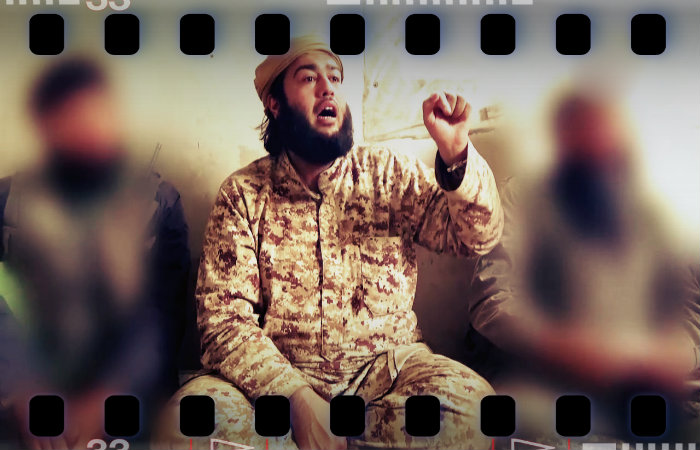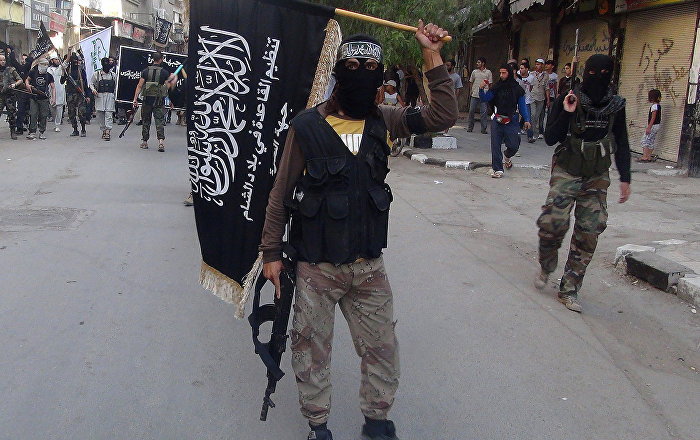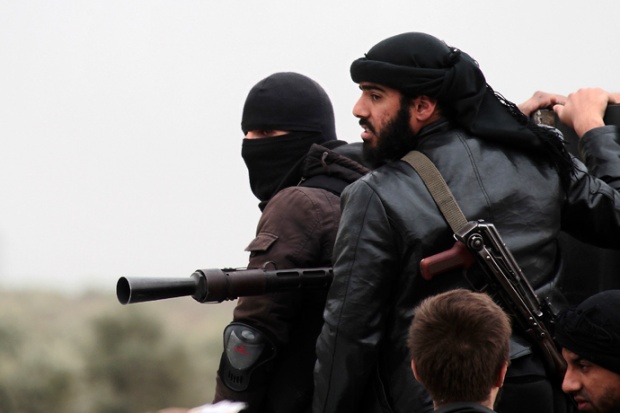Syria: US Smoke and Mirrors to Protect Terrorist Proxies in Aleppo
BY
21st Century Wire
Throughout the two and a half months that have passed since the start of the Cessation of Hostilities (CoH), the State Department has refused to acknowledge that the US backed rebel factions are fighting in Aleppo and elsewhere alongside Jabhat al-Nusra, Al-Qaeda’s branch in Syria.
There has not been a single press briefing where the spokesman has not accused Russia and Syria of targeting US backed rebel factions and civilians.
Whether it’s John Kirby or Mark Toner, the spokesman keeps talking about intermingling between the “moderates” and the Al-Qaeda affiliate and that the Russians/Syrians need to be able to separate the two. At the the press briefing of April 25, 2016 Mr Kirby said:
“So again, I go back to what I said before. We want to see the cessation observed by all parties. As I said in my answer to Said, we’re not blind to the fact that it’s a very dynamic situation in Aleppo and that there is intermingling. We’ve said that for a while now…
And we knew weeks ago, before the regime started to move on Aleppo, that in Aleppo in particular it was going to be a challenge. And it obviously has proven to be the case. So we’re going to continue to work with those opposition groups that we can influence, and we’re going to keep working with those countries on the opposition groups that they influence to do the best we can to get everybody to observe the cessation.
And to the degree that the – that separation can be had between opposition and al-Nusrah, obviously that’s beneficial to preserving the cessation of hostilities, which I know has seen many violations now in Aleppo.
I’m not saying that it’s held, okay. But to the degree that that intermingling can be avoided, that obviously assists in the situation, but it’s a very difficult, very fluid situation because the regime continues to move on Aleppo. And again, what we’ve said in the past is that the extension of Assad regime control over additional territory in Syria is not a good thing for the future of Syria.”
And again on April 28:
“No, I think what Mark was – he was restating a simple fact, which I’ve said to myself, which is that we know it’s a very fluid, dynamic environment, that there are – that there is intermingling between the groups.
Some of that is by design because they want to be near one another and some of it is by happen-stance. And it is why strikes in and around Aleppo become a more problematic issue, because it’s very difficult to separate some of these groups from one another geographically in order to – and then to be precise enough that only the group that you’re trying to go after is going to be hit.”
Jaish al-Fateh (the Army of Conquest)
Jaish al-Fateh is a coalition of Jihadist groups in Syria formed in March 2015 and led by Jabhat al-Nusra and Ahrar al-Sham. It was this coalition that in the span of one month (March 24 – April 25) managed to defeat the Syrian army taking from them most of Idlib province in the northwestern part of the country.

Sheikh Muhaysini, self proclaimed leader of Jaish Al-Fatah
During the next few months it had several military successes against government forces such as in Al-Mastuma, Ariha and Al-Ghab. However, in October 2015, after differences between the factions over the application of Islamic Law, Jabhat al-Nusra and Jund al-Aqsa left the coalition resulting in it’s disbandment.
More recently, both the Saudis and the Americans insisted that two factions, Ahrar al-Sham and the other major indigenous Jihadist faction Jaish al-Islam be part of the cessation of hostilities.
The Russians had designated both factions as terrorist and wanted them, along with Nusra to be excluded from it. During the last few weeks, Ahrar and several other rebel groups that are backed by the US, were fighting alongside Nusra against the pro-government forces and as a result were being targeted by the Russian and Syrian air forces.
The Americans clearly knew about this but continued to make the “intermingling” argument. So onApril 27, State Department spokesman Mark Toner called on the Russians to refrain from targeting these two factions:
QUESTION: Russia has proposed placing Jaysh al-Islam and Ahrar al-Sham on the UN sanctions list for ISIL. Do you agree with them?
MR TONER: No, we think that that would have damaging consequences to the cessation, and frankly, at a moment when we’re trying to make sure that it’s – we’re trying to de-escalate the situation on the ground. This has been something they have raised before. They’ve – it’s two opposition groups – Jaysh al-Islam, as you note, and Ahrar al-Sham. And they want to try to designate these groups that, frankly, are right now party to the cessation of hostilities. So we don’t want to see that happen. We don’t believe that that’s constructive.
QUESTION: But they are targeting them in Aleppo and elsewhere.
MR TONER: I agree, and that’s why they need to refrain from targeting these groups that are parties to the cessation of hostilities, and we call on them to do so.”
According to Al-Hayat newspaper on May 2, Ahrar al-Sham commander Abu Yazid Taftanaz said that the “Jaish al-Fateh operations room is coming back to life and it will include Jabhat al-Nusra, Ahrar al-Sham, Ajnad al-Sham, Failaq al-Sham, Jaish al-Sunna, Lewaa al-Haq and Hezb al-Islami al-Turkestani.”
On the next day, May 3, Jaish al Fateh’s English language twitter account pinned a tweet with the following picture and the hashtags #UNITY and #JAISHALFATH:

These were two reliable sources that confirmed that the US backed Jihadist faction Ahrar al-Sham has allied itself to the Al-Qaeda affiliate in Syria, Jabhat al-Nusra as part of a reformed Jaish al-Fateh. The Hollywood style poster clearly listed the names of the two factions. However, believe it or not, the State Department is still unaware of this. On the next day at the May 4 briefing, the following was said:
QUESTION: Did the rebels that the U.S. is in contact with in Aleppo agree to separate themselves from al-Nusrah there?
MR TONER: Again, that’s – this agreement or reaffirmation is predicated on the fact that – that both the regime and the opposition, who have signed up to the cessation, will act accordingly and in good faith —
QUESTION: Did they even tell you —
MR TONER: Let me finish, let me finish.
QUESTION: — that they’ll distance themselves?
MR TONER: No, no, let me finish. So in order to maintain this cessation or this renewed cessation of hostilities, it’s incumbent on them and it’s what our message is to them that they cannot interact with those parties on the ground who are not part of that cessation. Let me finish. And that’s what – that’s been a consistent message with – from us.
Early on May 5, Jaish al Fateh with Nusra and Ahrar al-Sham in the lead launched a huge offensive in South Aleppo on the town of Khan Touman which was in the government forces’ hands. By the time of that day’s press briefing, they had cut the supply routes to the soldiers defending it and had the town under siege. At the briefing later that day neither spokesman Mark Toner nor any of the journalists seemed to be aware of what was going on:
MR TONER: I understand that. Look, we’re aware that al-Nusrah is not part of the cessation of the hostilities, but we also are fully aware that the regime uses al-Nusrah as an excuse to target opposition groups. And again, we’ve talked about this at length, that they continue to hit civilian targets, opposition groups on the ground, who are party to the cessation, under the guise or veil of attacking Nusrah.
If they wanted to solely go after Nusrah and Daesh, that’s another story altogether. But I talked about this yesterday. Around Aleppo, which is frankly such a hot zone in terms of conflict right now, what we want to see overall is a de-escalation.
QUESTION: About 10 days ago Steve Warren of the U.S. Military, he said that it is primarily al-Nusrah that holds Aleppo. As I understand, the U.S. has leverage with the rebels. Did you get them to separate themselves from al-Nusrah in Aleppo?
MR TONER: So what we have said is that – and I said this just yesterday – is Aleppo – there are areas controlled by the opposition and there are areas controlled by Nusrah. And we’ve —
QUESTION: And those lines are fluid, as you say.
MR TONER: And the lines are fluid and that’s our challenge, in part, to make sure that those lines are more clearly delineated and that we have – we have conveyed that to the opposition.
By 7:00 am Damascus time on the morning of May 6, Khan Touman had fallen into the hands of Jaish al-Fateh (Nusra, Ahrar & Co). They were the ones who violated the ceasefire that was instated for Aleppo the day before. Additionally, the US backed factions had helped Al-Qaeda win this victory. Thirteen hours later at that day’s briefing, neither John Kirby nor the journalists seemed to be aware of any of this. When asked about how the cessation in Aleppo was doing, he said:
“Well, what we – right. So obviously, what we want and desire is for these cessations to be enduring. And what I can tell you is (a) we continue to watch the situation in Aleppo. It does appear as if the violence has decreased since it came into effect a couple of days ago and that seems to be the case today.
I can’t tell you that it’s perfect in every neighborhood of Aleppo, of course not. And obviously, the right number of violations is zero. That’s what we want. We’re still concerned about reports of violations. But in general, since the – it went into effect two days ago, we have seen a decreased level of violence in Aleppo, and we’d like to see that continue.”
The US backed factions and Al-Qaeda had just violated the truce and taken two towns and Kirby was still talking about intermingling:
“I’m not disputing the fact that in Aleppo these groups can be intermingled. In fact, sometimes it’s by design, especially by groups like al-Nusrah that want to help try to protect themselves by being geographically close or intermixed with groups that – either civilians or opposition groups that they know are parties to the cessation of hostilities.”
The disconnection between the State Department and the events on the ground in Aleppo is yet one more episode that illustrates what has been obvious to everyone for quite a while – that the United States Syria policy is a complete shambles. God help Syria and the whole region from what the US will do next whether under Obama or the next president.
***

